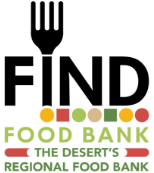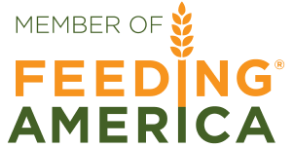Published July 8, 2021
Last Updated February 28, 2022
FIND Food Bank partnered with the California Farmworker Foundation (CFF), Growing Coachella Valley, California Association of Food Banks (CAFB), and the United Farm Workers (UFW) to provide nutritious food for farm working families.
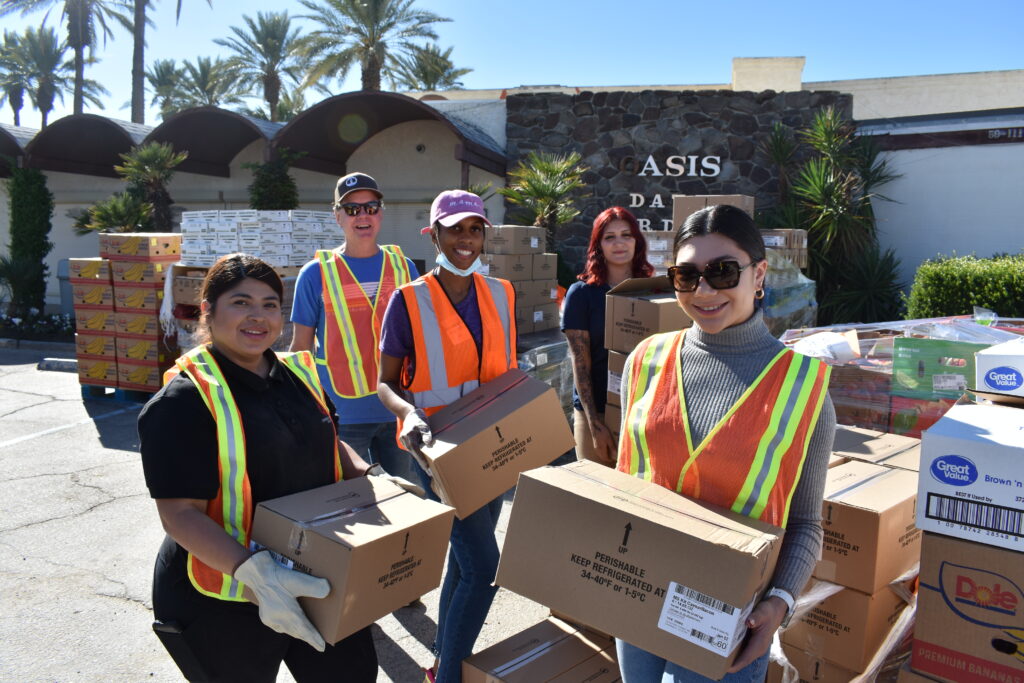
(From Left to Right) FIND CalFresh Outreach Manager, Guerillmina Cano, CFF Outreach Coordinator, Alejandra Rodriguez, and the National Guard distribute fresh produce and non-perishable goods directly to farmers in their cars at AgSer Contracting Fields. Maria Gonzalez, a former agricultural worker turned advocate with the California Farmworker Foundation (CFF), is on the frontlines meeting the needs of her fellow farmworkers. CFF is growing across California, immersing themselves in farm working communities, learning what specific services and critical resources are out of reach. In the Coachella Valley, much of the need stems from temperature extremes, extended off-seasons, and barriers to access essential resources that lead to income and food insecurity. Working with Growing Coachella Valley, California Farmworker Foundation, United Farm Workers, and the California Association of Food Banks, FIND is distributing combination food boxes through the summer containing culturally appropriate and healthy food items directly to farmworkers at their workplace. Farmworkers are the lifeblood of the Valley’s cultural and economic output. Agriculture is the second-largest contributor to the Desert’s economy and produces over 50% of the United States’ fruits and vegetables. Over 12,000 agricultural workers reside in the Eastern Coachella Valley. According to a survey of local farmworkers conducted by the California Farmworker Foundation, 62% of farmworkers cited experiencing food insecurity one month before the survey date. Of the total surveyed population, over 80% have one or more kids, and we know when children miss a meal, there are far worse consequences for their mental and physical development.
“Farmworkers are essential to our health and the food that’s on our table that we share with our family. Why wouldn’t we make it equally important for them to have access to nutritious food for their family?”
Lorena Marroquin, FIND Food Bank Director of Community Impact
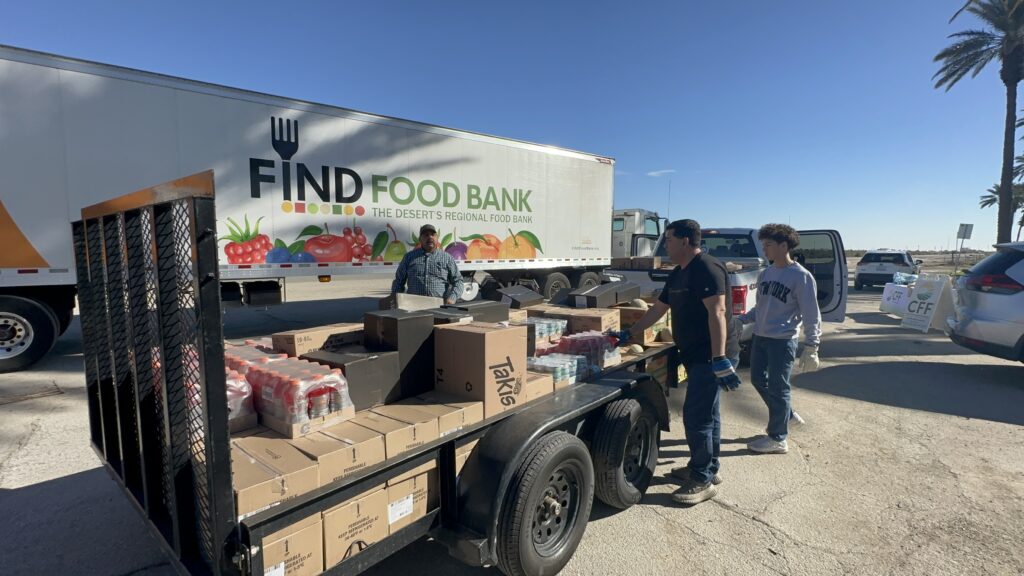
[Left] Farmworker in line near field of bell peppers owned by AgSer Contracting, holding one of FIND Food Bank’s supplemental bags of non-perishable dried goods in one hand with a thumbs up in the other hand. [Right] National Guard assisting the food distribution process. For the day, the volunteers served 700 farmworkers in less than two hours. FIND Food Bank’s direct food distribution program, suitably named Mercado Campesinos, flips the traditional farmer’s market model to bring food directly to farmworkers in need. Farmers receive a prepackaged box filled with canned goods, rice, beans, oil, tomato sauce, soup, and pasta. FIND also supplements the “combo boxes” with a bag of fresh seasonal produce. The food lasts about 3-5 days, depending on family/household size. One of the significant barriers to food access for farmworkers is a lack of culturally appropriate and affordable food items within a close distance. Local food pantries may only be able to supply donated goods, and if someone has never cooked with those items before, there is a good chance they just will not use it. To remedy this service gap, the California Association of Food Banks (CAFB) surveyed clients from food banks all over the state to learn what food items families need but are not receiving from their local food banks. The result is individual packages known as Alimentos Agricultores or Food for Farmworkers that contain the most needed and relevant food items to farmworkers. If the food is not culturally appropriate, familiar, or accessible to cook, then that food is not a service. Improving the accessibility of basic needs for farmworkers should include amplifying the voices of the groups and individuals who stand to benefit from the program. The pandemic created additional challenges for farm working families making affordable groceries, housing, and medicine difficult to obtain. Shelter in place orders placed kids back at home, and when over 80% of children in the three regional school districts received 2 out of 3 daily meals on school campuses, that created additional pressure for farm working families. With kids at home 24/7, parents have to spend more on food to feed hungry, bored mouths. COVID-19 also inflated childcare needs, and as a result, many families decided to have a single parent quit their job to take care of their children and relatives while the other spouse works. When your household income suddenly cuts in half, quality food can become the first item to slip from a tight budget. We deliver healthy groceries directly to the fields because many food distributions are during the day while farmworkers are working. Alejandra Rodriguez, CFF’s Outreach Specialist for the Eastern Coachella Valley and Riverside County, mentions the stigma and inconvenience of picking up food at public food distributions. Although some mobile food markets are at night, many people feel guilty, especially in the Hispanic community. “People are embarrassed to ask for public services,” explains Rodrigues. She elaborates that allowing farmworkers to come together at their workplace to receive the food prevents people from feeling ostracized because it is confidential, and the entire company is doing it.
“Here in the Coachella Valley, we suffer from a lot of breaks between the agricultural seasons, so there are people that sometimes go two to three weeks without a job, and they’re just waiting until their crew starts working again.”
Alejandra Rodriguez, CFF Outreach Coordinator
The Desert’s geographical location and extremely high temperatures raise unique challenges for our local agricultural communities. Rodriguez describes that during harvest season, farmers come back to the fields slowly. Only a few workers come back in increments until its peak time for growing again. Others remain underemployed for extended periods, adding financial pressure to make their budget stretch farther and longer. In the summer, a lot fewer people work during the day. For example, they can only harvest bell peppers at night due to a lack of shade. These sparse schedules breed income insecurity. Nearly 40% of local surveyed participants experienced reduced work hours throughout the pandemic year. Noel Perez, a Farm Labor Contractor, born and raised in the Coachella Valley, attended FIND’s distribution at AgSer Farms in Thermal in May. After picking up enough food supplies for six office staff members, he shared why these services are crucial to the community. “It’s always a help. Anything and everything that people can contribute is always a help.” Perez remembers volunteering at FIND Food Bank in college, and he carries that commitment to care for his neighbors with him. Raised in the agricultural industry, he understands how taking a little bit off farmworkers’ financial plate goes a long way.
“It’s an extra dinner on the table for the night or a couple of nights. If you have a family of ten at home because it is not uncommon for people to live with multiple families at home, then why not take home food?”Noel Perez, Farm Labor Contractor
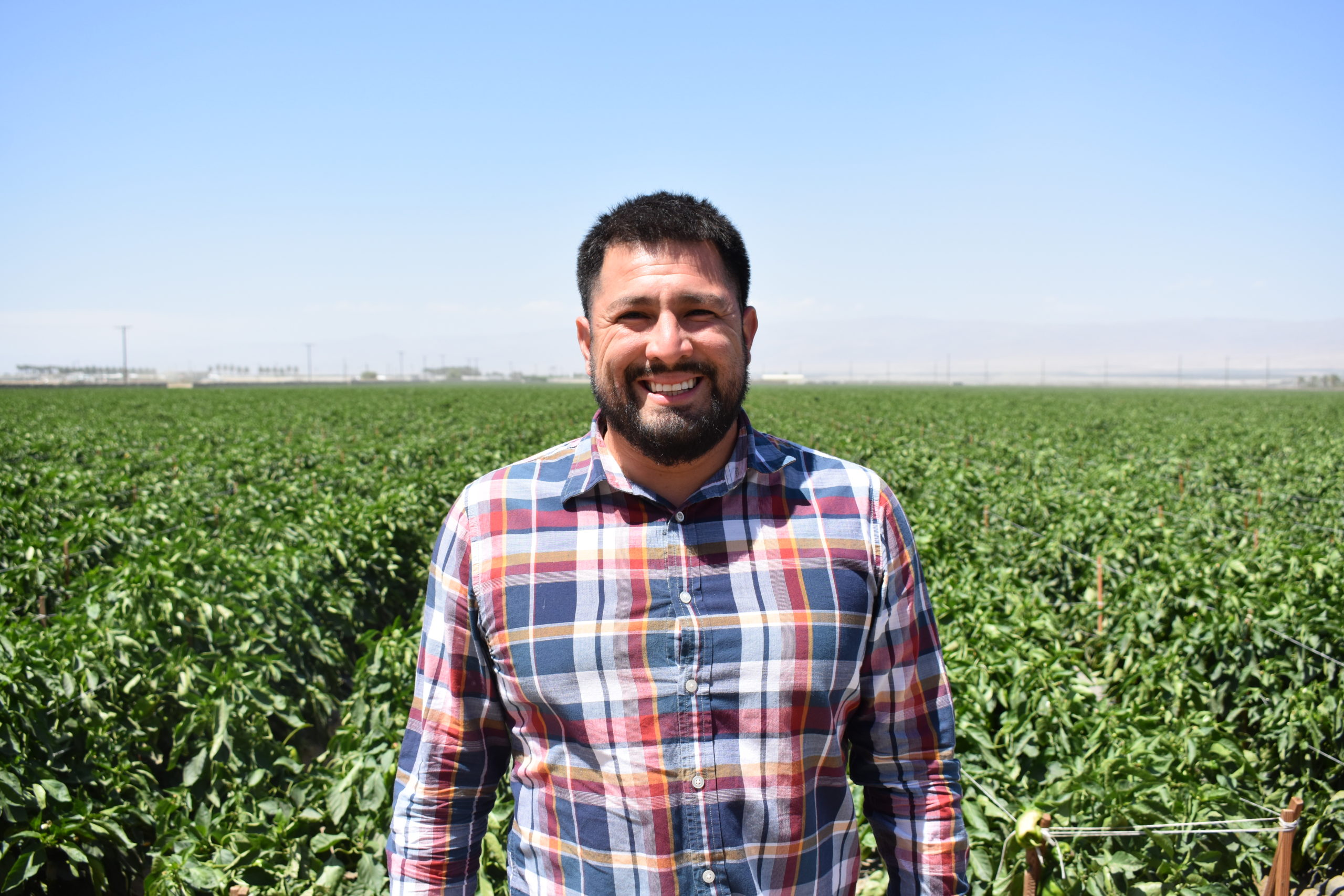
Noel Perez, Farm Labor Contractor smiling in front of a field of bell peppers at AgSer Farm Labor Contractors at the FIND Food Distribution on May 21, 2021. There are increasing concerns for our essential workers’ mental health, the fears and risks of frontline service during the COVID-19 pandemic took a toll, highlighting the need for special programs that meet farmworkers’ physical and emotional needs. An American Psychological Association poll found that “nearly 3 in 10 essential workers said their mental health has worsened over the past year.” A recent article in TIME Magazine emphasizes the direct ties between our physical and mental well-being and their effects on productivity. Food fulfills a physical need that fuels the brain and allows people to flourish in their everyday lives. Everyone deserves the sense of security that a guaranteed three meals a day can provide, especially those who we rely on to feed our own families.
“Here at the UFW Foundation, our mission is to empower communities to ensure human dignity and part of that is making sure that they have food so they can be healthy families.”
Leydy Rangel, Communications Manager United Farmworkers Foundation
Leydy Rangel, Communications Manager for United Farmworkers, is a Coachella Valley native raised by farm working parents who eventually worked in the fields herself. She understands on a personal level the daily struggles of farmworkers in accessing food and other basic needs. Rangel remembers growing up in the Eastern Coachella Valley and traveling long distances with her family and fellow farmworkers to access healthy, fresh food. It is a 20-minute drive from her home in the fields to the city’s grocery store, and this phenomenon, known as food deserts, is not unique but commonplace in most rural farm working communities. Food insecurity was an issue pre-pandemic, but Rangel stresses that it skyrocketed for one-half of our nation’s 2.4 million farm workers who are undocumented. Undocumented workers are unable to access federal assistance programs and stimulus checks meant to alleviate the financial hardships caused by the COVID-19 pandemic. On top of the financial stress is the physical and emotional stress of working under life and death conditions. Rangel talked about a study published by UC San Francisco. The results reveal that farmworkers are 39% more likely to die from contracting COVID-19 compared to other folks, and the data reflects that agricultural workers face much higher rates of the coronavirus. The first week in April 2020, UFW hosted a food distribution to reach rural undocumented farmworkers with fresh food, and they ended up having to turn hundreds of cars away. Rangel elaborates that these partnerships between food banks and local organizations are critical for undocumented folks to have their basic needs met. Rangel stresses that the Mercado Campesinos program is a “critical alliance” between FIND Food Bank and local non-profit organizations to be able to fill in the gaps for farmworkers and ensure they have the fresh food they need to stay healthy and prosper. UFW helps serve the folks that FIND cannot reach during our direct distributions. Through a text messaging program and in-take system, UFW delivers the meal kits to farmworkers directly at their homes. They specifically target the senior farm working community, who is especially vulnerable after years or decades of working in agriculture. Older Ag workers can often be immobile leaving them unable to access this critical food supply. Without reliable public transportation, carpooling is a popular means of travel for farmworkers. They can easily miss their one chance to pick up the food that will feed their family for the next week. Rangel emphasizes it is critical to meet farmworkers where they are to supply the vital nourishment they would miss otherwise.
“These are folks who spend hours doing very tough physical labor, and when they come home, they still have a family to attend to, just before the day ends, and then they have to do it all over again. And so if we could make it easier for them, by bringing food to their houses, we are ensuring that they are having that access to food.” Leydy Rangel
Through Growing Coachella Valley, we have established partnerships with six different growing companies, including Anthony Vineyards, Desert Fresh, Oasis Ranch Management, Ocean Mist Farms, Peter Rabbit Farms, and Prime Time International. FIND has worked with some of these growers for years, rescuing the fresh produce that helps feed the food-insecure populations across the desert region.
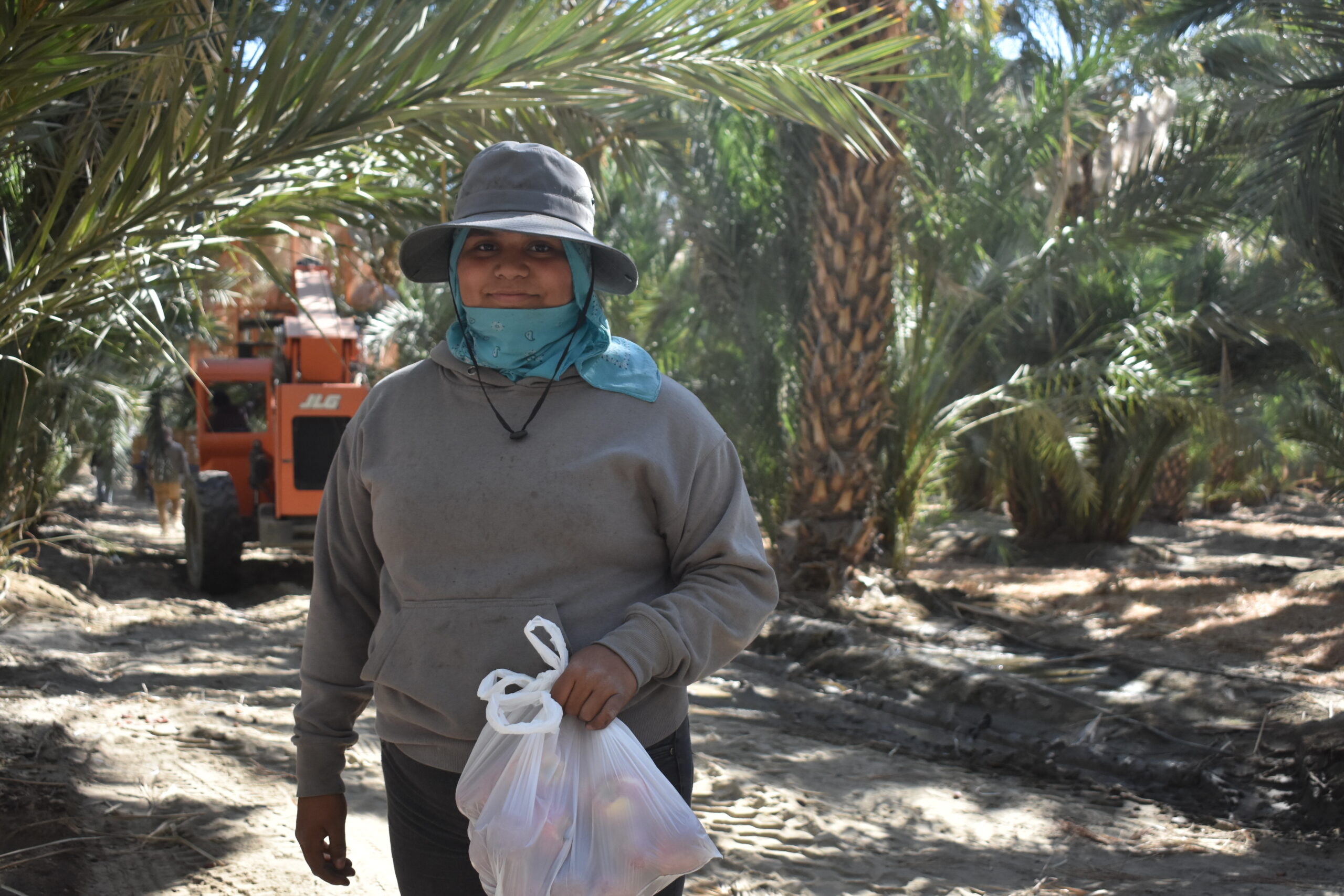
Farmworker holding a single serving bag of apples, potatoes, onions, celery, and pears at Anthony Vineyards in Coachella. Janell Percy, Executive Director of Growing Coachella Valley, voiced her enthusiasm for the success of the food assistance program. Specifically, she is excited that our organizations provide outreach for additional resources available to farmworkers. The drive-thru style mobile market brings the community together to learn about other financial resource programs, vaccine clinics, subsidized childcare, etc. Centralizing the resources at the food distribution location allows the community to access resources they may not have been able to before.
“It’s such a great partnership with farmers and all of the organizations working together to do something that is making a difference.”
Janell Percy, Executive Director of Growing Coachella Valley
Due to evident demand for Mercado Campesinos, we doubled our distribution sites at rotating locations twice a month. We expanded our partnerships with growers to pick up food from our warehouse, and CFF helps administer the distributions. By adjusting our food distribution model to meet unique geographical, occupational, and systemic obstacles, we can ensure our farm working population is adequately served. Today, Mercado Campinos feeds 500-1000 farmworkers in the Coachella Valley monthly. To create the food secure future for the heroes that secure our fresh food, we need your help to continue distributing the food items our farm working communities have come to love. The special combination food boxes are dwindling in supply, but your donation can help keep the program alive through the summer months and beyond. Instead of going out to eat to enjoy the fruits of our farmworkers’ labor, pay it forward and help put food on their table.
Support Coachella Valley Farmworkers
Sources:
California Farmworker Foundation
Longoria, E., & Ramírez, M. (2021, May 14). Farmworkers’ mental health must be a priority after covid-19. Time. Retrieved September 27, 2022, from https://time.com/5956667/farmworkers-mental-health-covid/

